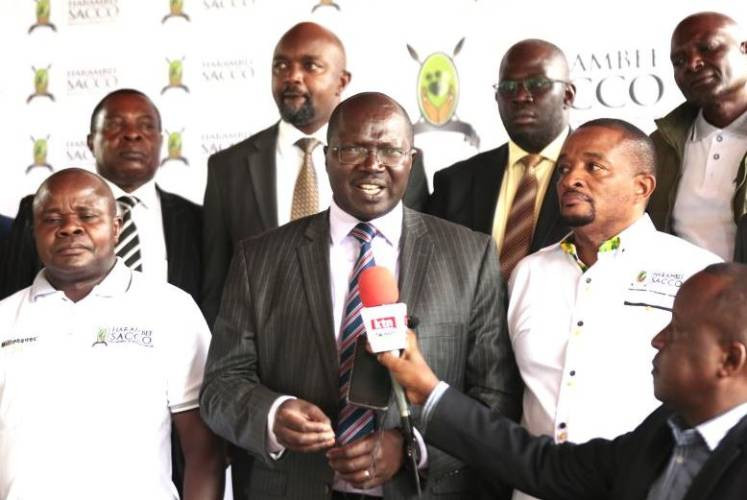By Anyang’ Nyong’o
A Senate Ad Hoc Committee is currently touring counties seeking views of elected leaders as well as wananchi on what we should do with Harambee. Should we continue with it?
In what form? What kind of financial problems should we solve through Harambee? In the event that there is a major public collection for a deserving social development project should those who contribute deduct such contributions from their taxes? How would such tax deduction arrangements be made?
While holding discussions with the County Assembly of Kakamega, the general feeling, very strongly expressed, was that Harambee should be abolished altogether. The reasons given were very persuasive.
First, although Harambee was started as a noble philanthropic undertaking where wananchi came together to pool together their meagre resources so as to build schools and health facilities, it progressively degenerated into a “free for all affair”. These days Harambee is organised even for non-deserving causes.
Two, such social amenities and infrastructural facilities like schools and health centres can now be put up by much better structured funds like the CDF and LATF. What is the point of burdening the taxpayer with Harambee, and in particular elected leaders, when there are these better and more accountable methods of creating such amenities and facilities?
Three, with devolution, grass root development can now be carried out within properly established local governance institutions than before. Hence devolved government can more efficiently use public resources to provide social amenities without relying on ad hoc funding through Harambee.
Four, if we get rid of Harambee we shall get rid of a major source of corruption in Kenyan politics. It is a form of corruption that cuts both ways: it involves both the giver and the given. For example, during campaign time Kenyans organise harambees for almost anything, and candidates try to outdo each other in contributions so as to impress the would-be voters.
When the election is over, the candidates — those elected as well as those defeated — are so broke that they can hardly visit their wards and constituencies. This is not a very good way of nurturing servant leaders.
Thus Harambee becomes a way of corruptly bribing voters while the voters also corruptly extort money from those seeking their votes. While all this goes against the grain of Chapter 6 of our Constitution on leadership and integrity, we nonetheless continue to tolerate it. This is wrong.
One lady, recently elected as a County Representative in Kakamega County, after going through this excruciating process in this last election, confessed to us that she wishes she never stood for elections and she is unlikely to do so again even though she would like to serve her people as their representative in the County Assembly.
According to her, Harambee only helps to nurture bad and corrupt leadership since it is a major form of bribery during campaign time. At such times it becomes a disguised and perhaps more noble way of buying the votes where those with ill-gotten wealth suddenly emerge as heroes of the people while the genuine “wakombozi” are looked down upon as “poor nothings”.
In the midst of all these strong sentiments against Harambee one dissenting but reasonable voice cautioned against the total banishment of Harambee notwithstanding the ways in which it has been abused.
According to this lady member of the County Assembly we need to preserve Harambee for deserving social causes but administer it well, ensuring that contributions are properly accounted for and that they go towards satisfying the intended objectives. For example, in the case where a poor orphan child needs fees to join a university, organising Harambee for such a child is worth it. But local leaders must be involved to ensure that unscrupulous individuals do not exploit such cases for their ill motives.
But there was also a general feeling that while such exceptional cases can be so catered for, we should progressively move towards a situation where access to education is guaranteed for all through the public education system, and foundations and trust funds exist to help the needy and the less fortunate.
Stay informed. Subscribe to our newsletter
Those who contribute to such foundations and trust funds should receive tax deductions as a reward and encouragement for philanthropy. In like manner, access to health should be catered for through a universal health insurance scheme and the poor should not be left at the mercy of an unstructured system of unpredictable philanthropy.
It was strongly felt that purely personal and family undertakings such as pre-weddings and weddings should not exploit the public through Harambee. In such instances individuals concerned should quietly use their family networks to raise resources rather than print cards and subject the public to monetary harassment to meet purely personal expenses.
Senator Moses Wetang’ula always tells us this story of a woman magistrate who had Harambee cards in her chambers to collect money for her wedding, which never took place after collecting money from unsuspecting individuals needing her services for over one year!
The Senate Ad Hoc Committee, after receiving diverse views from the public, will prepare a policy paper and a bill dealing with Harambee and philanthropy in Kenya. This writer, as chairman of this committee, welcomes views on behalf of the committee through the email below. We are aware that there have been previous collections of public views on Harambee and reports submitted to Parliament, such as the Koigi wa Wamwere Report.
We appreciate all these reports and have used them. But we want to go further into the realm of concrete public policy and law making.
 The Standard Group Plc is a
multi-media organization with investments in media platforms spanning newspaper
print operations, television, radio broadcasting, digital and online services. The
Standard Group is recognized as a leading multi-media house in Kenya with a key
influence in matters of national and international interest.
The Standard Group Plc is a
multi-media organization with investments in media platforms spanning newspaper
print operations, television, radio broadcasting, digital and online services. The
Standard Group is recognized as a leading multi-media house in Kenya with a key
influence in matters of national and international interest.
 The Standard Group Plc is a
multi-media organization with investments in media platforms spanning newspaper
print operations, television, radio broadcasting, digital and online services. The
Standard Group is recognized as a leading multi-media house in Kenya with a key
influence in matters of national and international interest.
The Standard Group Plc is a
multi-media organization with investments in media platforms spanning newspaper
print operations, television, radio broadcasting, digital and online services. The
Standard Group is recognized as a leading multi-media house in Kenya with a key
influence in matters of national and international interest.








